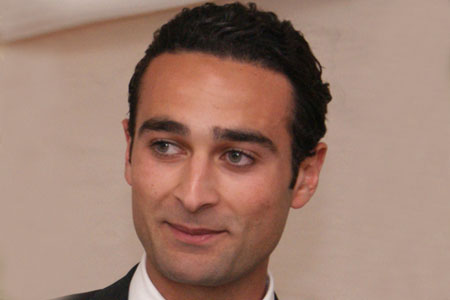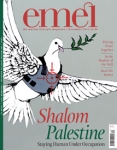
10 Questions with Khaled Sabawi
Issue 87 December 2011
Khaled grew up in Canada as the son of Palestinian immigrants, and graduated in Engineering from the University of Waterloo, but decided to go back to Palestine and work there. He initially joined Union Construction and Investment (UCI) Corp, a leading Palestinian construction company, and installed the first geothermal system in the region in the company’s headquarters, before going on to become the Founder and President of MENA Geothermal, a Palestinian green energy business. The installation attracted a lot of attention, and Khaled set up MENA Geothermal under UCI to concentrate on promoting the long-term benefits of renewable and geothermal energy in the region.
1. To what extent is your success a product of your upbringing and background?
Being the son of Palestinian refugees, you are raised knowing the sacrifices that your parents went through to get you to where you are. From the very beginning, my parents instilled in us the notion that we need to work extra hard, not just hard, because they saw that we had an opportunity and it would be a terrible loss if we didn’t take advantage of it. In addition, as a Palestinian, you know that the reason your people continue to suffer is because there is a very influential lobby in America that controls its foreign policy. The people that fund the lobby and the system have people who work hard to become influential, so it was almost the perception that if you want to become influential, you need to be as successful as possible.
2. Who and what have been the greatest influence in you?
My father was a great influence on me—he had to make a number of sacrifices for his family since a young age. His parents passed away when he was young, so he had to help raise his seven brothers and three sisters, and they went to Kuwait before emigrating to Canada, so that we could be raised there. Even whilst we were growing up in Canada, he would go to Palestine and work there, and would visit us every four months.
The other individual to have a great influence on me was Edward Said. I highly respect his work; the objective views and humanist approach that he had would have a massive impact on my own philosophy, in terms of giving back and maintaining consistency in morals and ethics.
3. What is your educational background and were you good at school?
The elementary school that I went to had a huge impact on me. I never suffered any discrimination, and was encouraged to celebrate my own identity, which in turn empowered me. It was an excellent environment that pushes you to become outgoing and ambitious. We also had to give speeches in front of our class from a young age, and this enhanced my public speaking abilities.
4. What was your biggest break and was there an element of luck involved?
Last year, we were awarded a contract to install a geothermal heating and cooling system at the University of Madaba in Jordan. It was just a year and a half after our inception, and seemed to justify all the hard work we had done. There was no way that we expected to reach those levels of revenue in such a small time, especially since we were a newly formed renewable energy company in the occupied Palestinian territories.
Furthermore, a lot of the directors at UCI were cynical about geothermal energy and its potential, so this was a way of proving them wrong. Generally, in the Middle East, people don’t like new technology because they feel that it takes away from the old technology that people are already profiting on, even though the new technology is more sustainable.
I don’t believe in luck—for me, it is another way of saying opportunity meets readiness. A lot of other companies were in the running for the contract with the university, but we were the most credible, and were very meticulous and thorough with our previous installations.
5. What has been your biggest failure and how did you recover?
When we first started the company, there were a lot of challenges and bad decisions that I made, which I now regret, and ended up being very costly. For example, we brought in a consultant from Canada, and this was because there is an underlying insecurity amongst those who live in the Middle East that we need a smarter, white person to teach us the right way, and you get engulfed in that culture when you come here.
In spite of all the training that I had, I thought it would be safer to bring this guy in, and he was very expensive. After a few months, we realised he was utterly useless, and this taught me to be a lot more confident; there’s nothing we can’t do and learn for ourselves, and that the local engineers, after I had trained them up, were much smarter and hard-working.
This insecurity even permeates through to the Palestinian Energy Authority. We approached them to ask what they were doing to incentivise geothermal power to Palestinians, and discovered that they’d brought in a European consulting company to report back to them on the feasibility of geothermal power in Palestine—three years after we had started up and almost finished the university project. We found this insulting, and asked to see the report that they had commissioned. Upon reading it, we realised it was a sham and submitted a credible response to it.
6. What can others possibly learn from your success?
If MENA Geothermal can build sustainably, in spite of extraordinary obstacles and challenges, it’s possible for anyone to do this across the Middle East and North Africa. We faced enormous challenges operating under the Israeli occupation—imagine trying to import a four tonne drilling machine into the West Bank, and the security problems that come with it—they actually thought that we were trying to drill tunnels from Ramallah to Tel Aviv.
If we were able to do this here, then anyone can do it anywhere. We believe that developing countries are in a unique position to build sustainably and right, and it is a good time to build from scratch.
7. Who are your heroes in life?
I would say my parents. They started with nothing, and it’s amazing to see what they have accomplished now. They also gave me the best advice—initially, I wanted to study political science, but after telling my father, he took a long, hard look at me and said, “Son, you are Palestinian. Your whole life is going to be politics.” It was because of his advice that I chose to study engineering with the intention of going into business.
8. What’s the greatest pleasure you have had from your success?
There are three that spring to mind. Firstly, having a goal, working towards it, and achieving it is enormously satisfying and is a great confidence boost to try to do more if another opportunity arises. Secondly, to prove to people that it is possible to come back and help your people if they are struggling. Lastly, that it is possible to run a business that has a tremendous social effect and be profitable. People thought it may be rare for a business to do this, but I feel that is down to a lack of vision. I’m very satisfied that I can set an example for what the private sector can do in a place that is in need.
9. What do you think are the greatest enemies of success?
Any ideology that is inherently racist is fundamentally the enemy of success for a human being—people immediately pin themselves as something that is better, or someone that deserves more. This extends to anything that prevents equality or equal opportunities, as well as any dictators that reside over a government that is preventing people from achieving their economic potential and improving their quality of life.
10. What would you like to say to people when it is time for you to leave this world?
If you have any goal in mind, there is no reason why you cannot achieve it if you work significantly hard and stay focussed. If you are prepared, the opportunity will come, it’s only a matter of time.
Bookmark this |
|
Add to DIGG |
|
Add to del.icio.us |
|
Stumble this |
|
Share on Facebook |
|
Share this |
|
Send to a Friend |
|
Link to this |
|
Printer Friendly |
|
Print in plain text |
|


Comments
0 Comments